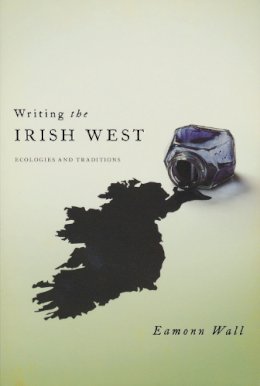73%OFF

Stock image for illustration purposes only - book cover, edition or condition may vary.
Writing the Irish West: Ecologies and Traditions
Eamonn Wall
FREE Delivery in Ireland
Description for Writing the Irish West: Ecologies and Traditions
paperback. Num Pages: 248 pages. BIC Classification: 1DBR; DSK. Category: (G) General (US: Trade). Dimension: 156 x 231 x 18. Weight in Grams: 366.
In recent decades, a large and well-regarded volume of creative work has emerged from the West of Ireland, written by residents of the region, by those raised in West of Ireland families outside the region, and by seasonal and occasional visitors. The fiction of John McGahern, the plays and films of Martin McDonagh, Tim Robinson's maps and place studies, the work of Richard Murphy, and the poetry of Mary O'Malley, Moya Cannon, and Sean Lysaght are known and admired worldwide. Yet, for all that has been made of the Western themes and settings in the work of such writers, and ... Read moreothers, little effort has been made to examine their work collectively and in depth. Eamonn Wall's Writing the Irish West: Ecologies and Traditions is the first critical study to examine these seven contemporary Irish writers in their shared Western context.
Wall describes, analyzes, and contextualizes their work to show the fundamental ways in which the region has influenced and shaped it. Certain themes and commonplaces recur obsessively: the bilingual nature of Western life and language, landscape, gender, poverty, the individual's relationship to nature and place, connections between Christianity and paganism, the overpowering weight of history, and each author's complex relationship to the Irish Literary Revival of Yeats, Lady Gregory, and J. M. Synge. Although well-developed theoretical approaches to reading Western American literature have been practiced for years, no such approaches exist in Irish discourse. Wall draws on extensive research on the literature of the American West for a comparative study that places the Irish and American Wests side by side. Underlined by an engagement with the role ecology plays in the study of literature, Writing the Irish West highlights uncanny connections between the works of West-of-Ireland writers and their Western American counterparts.
Show Less
Product Details
Publisher
University of Notre Dame Press
Place of Publication
Notre Dame IN, United States
Shipping Time
Usually ships in 2 to 4 working days
About Eamonn Wall
Eamonn Wall is Smurfit-Stone Professor of Irish Studies and Professor of English at the University of Missouri-St. Louis.
Reviews for Writing the Irish West: Ecologies and Traditions
“This book is both a fitting and wonderful amalgam of criticism and close reading of the literature of the Irish West, often through the lens of the less encumbered literature of the American West. . . . The beauty of this book is that it brings together authors who have not been considered collectively as West of Ireland authors, until ... Read morenow. Yet it has much to offer to both student and teacher, novice and expert.” —Estudios Irlandeses “Looking into alternative discourses within Irish studies will benefit not only ecocritics but also Irish scholars who are hesitant to embrace the imported ecocritical movement. Wall’s Writing the Irish West undoubtedly addresses the first- and second-wave concerns of ecocriticism, while fostering a growing body of work in Irish studies devoted to understanding the complex relationship among nature, landscape, environment, and geography that exists within Ireland’s literary history.” —Irish Studies Review “For readers and scholars with interests in writing about the American West, [Wall's] extended reflections on these parallels prove illuminating and provocative, because in both traditions the ‘Westernness’ he opens up to further exploration is at once intensely regional, national, and, in some respects, even global. . . . By initiating a cross-cultural dialogue about the meanings of the ‘West,’ Writing the Irish West opens up intriguing new possibilities for Irish studies and American studies.” —Western American Literature “Wall’s text is useful for giving credit to several excellent Irish writers and for questioning many well-worn images of the Irish landscape. Overall, this text prepares the way for future ecocritical approaches to Irish literature and is a welcome addition to the field of Irish studies.” —Interdisciplinary Studies in Literature and Environment “Wall . . . offers an exciting examination of the work of seven contemporary authors and finds correlations between the literature of West Ireland and the literature of the American West. . . . Throughout, Wall opens up new interpretations of contemporary literature.” —Choice “This book makes an important contribution to transatlantic Irish studies. Wall's critical focus on ecocriticism is timely, providing new readings of Irish writing across genres. He employs a methodology that attends to literary cartography, postcolonial contexts, and persuasive close readings of his authors. What results is a book that is fresh, illuminating, and substantive, one that elucidates a new understanding of the literary and cinematic representations of the American West.” —Susan N. Maher, Dean, College of Liberal Arts, University of Minnesota Duluth "Eamonn Wall's splendid new study ranges freely through contemporary Irish and American culture with both grace and precision. Focused on seven writers about the Irish West, Wall summons apt and surprising parallels and contrasts within Ireland itself and across the water to America. If, as T. S. Eliot said, disparate materials are always forming new wholes in the poet's mind, then this is a poet's criticism par excellence." —George Bornstein, University of Michigan "Eamonn Wall’s daring book explores the cultural ecology of Ireland and America through the creation of an idea of the west that is at once gesture, criticism, and a sensory history of passing time. If true places are never on maps, Wall’s critical cartography points the reader to new departures in the reading of Tim Robinson, Richard Murphy, and many others. Personal, reflective, and ambitious to engage with the wonder of literature and place, Wall has written a rich future for the writers and landscapes he loves." —Nicholas Allen, National University of Ireland, Galway Show Less


